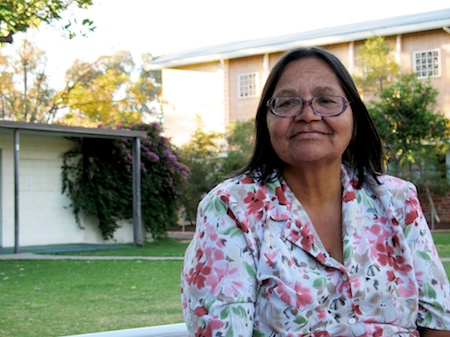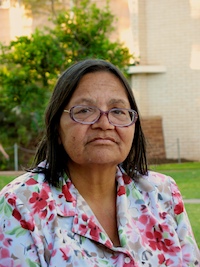06.09.07

I was one of the first Aboriginal Health Workers to graduate. I started when I was 18 years old.
Back in 1969 the Central Australian Aboriginal Congress (CAAC) had started a medical service in Hartley Street. I started as a cleaner.
I was inquisitive about how health worked, I started to think, Doctor, Health worker, what is that? I just got interested in how doctors find out a diagnosis, how they treat. 'Well, we'll show you then," they said. They wanted four indigenous workers, two of them ladies who were fluent in language [Arrente] and English. It wasn't long before I started knowing how to introduce myself as an AHW and interview someone before the doctor.
Then came more senior work with doctors and nurses - rosters, medical meetings. I started to coordinate the other three health workers to take visits to the town camps, with the Congress health centre nurse. I told them, don't expect them to come to you, you've got to go to them. You mob put up with pain, they don't come in.
I think have four Aboriginal employees made a cultural presence, made it a more friendly service. People need to feel confident.
Working at Congress was a foundation for me to respect other cultures outside Alice. I had culture shock - even just [Aboriginal] mob coming out speaking other language.
I became the regional manager for the Alice/Barkly [region] AHWs. I'd go out with the other managers, a senior doctor, and sort out the problems. I started to get an understanding that rather than an open honest discussion there was a conflict of roles, and AHWs started leaving. They didn't feel like it was their clinic any more.
The nurses were stressed - they'd fly out [for a break], leaving the AHW behind. There were till uneven conditions of service. There was no leave [for AHWs] for sorry business, for ceremonial business.
Somehow you've got to make the nurse know the clinic is ours in partnership. The nurse used to come, want to go straight to the clinic. no, no - sit down here first. Sit down, talk for a few minutes. What do you see in my community? Is it clean? Are the dogs healthy? You have to leave your standard of living behind. You've got to take time out to really think about the social skills to survive out here.
There's an exchange of language both ways between the doctor [and patients]. There were times when the doctor didn' talk to the patient, instead they'd talk about the patient in front of them. Sometimes the doctor wouldn't introduce the AHW. Not involving you. I tried to incorporate awareness that we already had traditional healers. Relationships are very improtant, social networking with others.
Part of it was always the barriers of profession: "I've trained for six years...". For the AHWs it was new and fresh, an exciting career. Now it's like turning abck the clock, there's no recognition that AHWs and doctors could be at the same level.
I had the freedom to explore the whiteman system: how to use it, how to tell our mob how to take it up for their problems. A lot of people nowadays don't want to talk up.
It took me about thirty years to get to be poilicy officer. I found it really hard, not being respected for who I was - I wasn't invited for policy, finance meetings. It was a token position. Instead I used to go and pick up the little souls in the pockets of the system: "when you're stressed, just sit on the lawn, go meet people on the streets."
After a while I said I don't want to be policy officer, I told my boss that I was going. I sat in the mall, my spirit was crying. People came, an Aunty came and said: "come walk with us." She changed my life. We spent a couple of days together, we formed a relationship. I came back, my boss cried with relief when I came back. But I asked for a transfer to Wallace Rockhole: not as a Health Worker, as a Health Educator. I spent four hours in the clinic, one hour in the school.
We'd put roses, scones and dressings on a trolley. The old people came. That made it their place.
Wednesdays, I'd do education at the school. The clinic is a sick person's place, the school in neutral.
Eventually in 1992 I came back to Alice, to Tangentyere Council as a manager of a training program called "Family Wellbeing". It was written by the Stolen Generation mob in the South Australian eduction unit. There was a lot around identity, dislocation, being taken away from family, from your spirit. Stolen Generation people came in to talk.
It was also grassroots community based issues. What it means to be taken away from country, ro recolelction of it. And how to go back to country. Do I want to go back? What about my children's future. You can imagine what it's like now with the government. You can't mainstream Aboriginal nations.
I started up the healing centre while I was at the council. It's an indigenous cultural service that provides access to traditional cultural practices - bush medicine, bush tucker. We're working with all different family groups in relation to accessing traditional nungars [traditional healers]. It's called Akeyullere Apmera, the People's Healing Place.
If you went there you'd feel comfort - it's on a sacred site. "What a nice feeling," you'd think, you wouldn't want to leave.
Spirit families came to me in the dead of the night. They told me I'd be given four mothers, that they would help me start the centre. I went and got them.
 We started doing traditional smokings. People started coming, twenty to forty people a night, they could feel the energy. It's like quickening, like passover. There's a cloud between heaven and earth, we collect the spirits of people around Alice and take them through. My role is to collect the right bushes from the land and distribute them to the mothers.
We started doing traditional smokings. People started coming, twenty to forty people a night, they could feel the energy. It's like quickening, like passover. There's a cloud between heaven and earth, we collect the spirits of people around Alice and take them through. My role is to collect the right bushes from the land and distribute them to the mothers.
Another case was asthma - the smoking gave confidence in her spirit - that's linked to health.
For eleven years we had no funding. Now we just got two years funding. We'll have a men's healing camp, and two women's camps.
I've learned to know who I am, my place in my society. I know how to relate to people, who to relate to, a shared responsibility with the elders. A deeper understanding of my role - an obligation to take care of people. The only thing that keeps me going is that in the spirit world I'm doing the right thing and I've got the backing of the elders.
The next journey is to reclaim Alice. This town isn't ready for Aborigines. We need to reclaim this town.
I'm here for the soul problems. You mob are here for the acute problems.

Kathy talked to me on Sunday, June 23, 2007.
Enjoyed reading? Consider supporting future entries with a donation.
Copyright © 2007 Nick McIntosh. All rights reserved.
All web design, web construction, interviews and photography by Nick McIntosh
